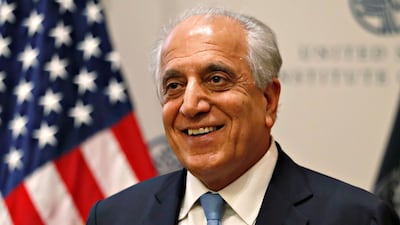The United States and the Afghan Taliban resumed talks in Doha on Saturday amid high hopes of a deal to end nearly two decades of conflict.
"The Taliban are signalling they would like to conclude an agreement. We are ready for a good agreement," the US peace envoy Zalmay Khalilzad tweeted ahead of the talks.
Washington is hoping for a breakthrough in its bid to end 18 years of war in Afghanistan, ideally before Afghan presidential elections scheduled for next month. A US-led coalition invaded Afghanistan and toppled the Taliban in 2001, accusing it of harbouring the Al Qaeda militants behind the September 11 attacks.
The US now wants to withdraw thousands of troops and end its longest war but is seeking assurances from the Taliban that they will not provide haven to terrorist groups such as Al Qaeda and ISIS. It also wants the Taliban to negotiate directly with the Afghan government, something the group has refused to do so far.
"We are pursuing a peace agreement not a withdrawal agreement, a peace agreement that enables withdrawal," Mr Khalilzad tweeted on Friday after talks with Prime Minister Imran Khan in Pakistan.
"Our presence in Afghanistan is conditions-based, and any withdrawal will be conditions-based."
The Washington Post reported on Thursday that an initial deal to end the war would see the US force in Afghanistan reduced to as low as 8,000 from the current level of around 14,000.
Meanwhile the Afghan government has formed a negotiating team for separate peace talks with the Taliban that diplomats hope could be held as early as later this month, even though the Taliban have so far dismissed suggestions that they will take part.
An Afghan official hinted last week that the government of President Ashraf Ghani was preparing for direct talks with the Taliban, the details of which have yet to be announced.
"We have no preconditions to begin talks, but the peace agreement is not without conditions," Mr Ghani wrote in Pashto on his Facebook page on Friday.
"We want a republic government not an emirate," he said, challenging the Taliban's insistence on reverting to the "Islamic Emirate" name Afghanistan bore under its rule.
"The negotiations will be tough, and the Taliban should know that no Afghan is inferior in religion or courage to them."
Bruce Hoffman, a counter-terrorism expert at the Council on Foreign Relations, said he doubted the Taliban would ever renounce Al Qaeda.
"I believe that the Taliban and Al Qaeda will remain joined at the hip," he told Agence France-Presse, questioning the sense of "believing the word of terrorist organisations".
"The Taliban can negotiate with the United States" but would be unlikely to break their personal pledges to Al Qaeda, he said.
"It means that Al Qaeda was going to continue fighting, counting on that once the US left Afghanistan it wasn't going to come back.
"Al Qaeda and the Taliban would have free rein. It's not a far-fetched assumption."
The thorny issues of power-sharing with the Taliban, the role of regional powers including Pakistan and India, and the fate of Mr Ghani's administration also remain unresolved.
The latest round of US-Taliban negotiations, the eighth since President Donald Trump appointed Mr Khalilzad as his special envoy to Afghanistan in September last year, follows talks in Doha last month between influential Afghans and the Taliban at which they agreed on a "roadmap for peace" but stopped short of calling for a ceasefire.
The Taliban, who effectively control half the country, have stepped up attacks on security forces and government targets despite the talks with the US and fellow Afghans.
The United Nations said on Saturday that civilian casualty rates across Afghanistan jumped back to record levels last month, following a dip earlier in the year.
More than 1,500 civilians were killed or wounded in the conflict in July, the highest monthly toll so far in 2019 and the deadliest single month since May 2017.
It said more than 50 per cent of casualties were caused by bombings. A roadside bomb tore through a bus in western Afghanistan on Wednesday, killing at least 32 people. A complex attack on the office of the president's running mate last weekend killed at least 20 people. The target of the attack, former intelligence chief Amrullah Saleh, escaped unharmed. No one has claimed either attack.
An ISIS affiliate also operates in Afghanistan, targeting security forces as well as minority Shiites.
On Saturday, a roadside bomb in the western Herat province killed a district chief and another person, police said. In the southern city of Kandahar, a suicide bomber on a motorcycle wounded at least eight civilians.
"As peace efforts have intensified in recent weeks so too has the conflict on the ground," said Tadamichi Yamamoto, the UN envoy to Afghanistan. "I call on all parties not to ramp up military operations thinking that doing so will give them a stronger position in talks about peace."

